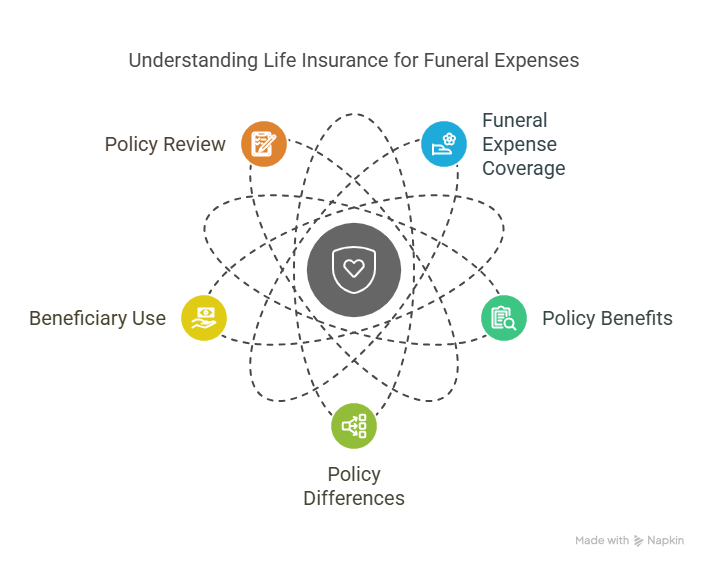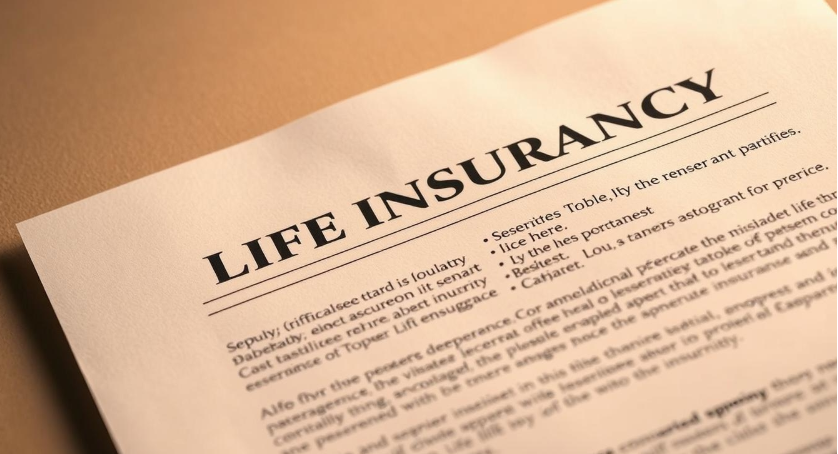Losing a loved one is never easy, and the financial burden of funeral expenses can add to the emotional distress. Many families wonder if they can rely on a life insurance policy to help cover these costs.
Funeral expenses can be substantial, and understanding whether a life insurance policy can provide the necessary financial support is crucial. This guide aims to provide clarity on how life insurance benefits can be utilized to ease the financial strain of funeral costs.
By understanding the benefits and limitations of life insurance in covering funeral expenses, families can better plan and manage their financial obligations during a difficult time.
Key Takeaways
- Life insurance can be used to cover funeral expenses.
- Understanding the policy benefits is crucial.
- Not all life insurance policies are the same; some may offer more comprehensive coverage.
- Beneficiaries can use the payout to cover funeral costs.
- It’s essential to review the policy details.

Understanding How Life Insurance Covers Funeral Costs
Life insurance policies can play a crucial role in covering funeral expenses, alleviating some of the financial stress during a difficult time. When considering life insurance for funeral costs, it’s essential to understand the types of policies available and the average funeral expenses in the United States.
Types of Life Insurance Policies That Cover Funerals
There are several types of life insurance policies that can be used to cover funeral expenses. Term life insurance and whole life insurance are two common options. Term life insurance provides coverage for a specified period, while whole life insurance covers the insured for their lifetime. Both types can provide a death benefit that can be used for funeral costs.
Average Funeral Costs in the United States
The average cost of a funeral in the United States can vary significantly depending on factors such as location and services chosen. According to recent data, the average funeral cost, including burial expenses, can range from $7,000 to $12,000. Here is a breakdown of average funeral costs:
| Service | Average Cost |
|---|---|
| Funeral Home Services | $2,000 – $5,000 |
| Burial Plot | $1,000 – $3,000 |
| Casket | $2,000 – $10,000 |
| Other Expenses | $1,000 – $2,000 |
Will Life Insurance Pay for Funeral Expenses Directly?
When a loved one passes away, understanding whether their life insurance will cover funeral expenses directly can be a significant relief. Life insurance is designed to provide financial support to beneficiaries after a loss, but the process of accessing these funds can be unclear.
The Death Benefit Process Explained
The death benefit is the amount paid out by the life insurance company upon the policyholder’s death. This benefit is typically paid directly to the beneficiaries named in the policy. Understanding the death benefit process is crucial for accessing funds that can be used for funeral expenses. The process usually involves the insurance company verifying the policyholder’s death and confirming the beneficiary details.
Filing a Claim for Funeral Expenses
To use the life insurance payout for funeral costs, beneficiaries must file a claim with the insurance company. This involves submitting required documents, such as the death certificate and proof of identity. The claim process for funeral costs can vary between insurance providers, but generally, it requires beneficiaries to fill out a claim form and provide the necessary documentation. Once the claim is processed, the insurance company disburses the death benefit, which can then be used to cover funeral expenses.
Specialized Policies for Funeral Expenses
Specialized insurance policies offer a practical solution for individuals looking to cover funeral expenses without burdening their loved ones. These policies are designed to provide financial assistance specifically for funeral costs, ensuring that families can manage their grief without the added stress of financial strain.
Final Expense Insurance Options
Final expense insurance is a type of life insurance that is specifically designed to cover funeral expenses, including burial expenses coverage. It typically offers a smaller death benefit compared to traditional life insurance policies, making it more accessible to individuals who may not qualify for or cannot afford larger policies.
Pre-Need Funeral Insurance
Pre-need funeral insurance allows individuals to plan and pay for their funeral expenses in advance. This type of insurance provides peace of mind, knowing that funeral costs are covered, and can help reduce the financial burden on loved ones.
Potential Limitations and Exclusions
While specialized policies for funeral expenses offer valuable benefits, it’s essential to understand their potential limitations and exclusions. For instance, some policies may have waiting periods or specific conditions that could affect the payout. Reviewing the policy details carefully is crucial to ensure it meets your needs.
Conclusion
Understanding whether life insurance will pay for funeral expenses can provide peace of mind during a difficult time. As discussed, various life insurance policies, including final expense insurance and pre-need funeral insurance, can help cover funeral costs.
When a policyholder passes away, the death benefit from their life insurance policy can be used to pay for funeral expenses, alleviating the financial burden on their loved ones. It’s essential to review the policy details and understand the process for filing a claim.
By planning ahead and choosing the right life insurance coverage, individuals can ensure that their funeral expenses are covered, allowing their families to focus on celebrating their life rather than worrying about the financial implications.
Ultimately, life insurance can play a significant role in managing funeral expenses, and knowing how to utilize it effectively can be a valuable resource for those grieving.
FAQ
Will life insurance pay for funeral expenses directly to the funeral home?
Typically, life insurance companies pay the death benefit to the beneficiary, who then uses the funds to pay for funeral expenses. However, some insurance companies may allow the beneficiary to assign the benefit to the funeral home or make a direct payment to the funeral home if the beneficiary requests it.
What types of life insurance policies cover funeral expenses?
Various types of life insurance policies can be used to cover funeral expenses, including term life insurance, whole life insurance, final expense insurance, and pre-need funeral insurance. The specific policy and coverage will determine the extent to which funeral expenses are covered.
How do I file a claim for funeral expenses using a life insurance policy?
To file a claim for funeral expenses, the beneficiary typically needs to contact the insurance company, provide the required documentation, such as the death certificate and policy documents, and complete a claim form. The insurance company will then process the claim and pay the death benefit to the beneficiary.
Are there any limitations or exclusions to life insurance coverage for funeral expenses?
Yes, some life insurance policies may have limitations or exclusions that affect coverage for funeral expenses. For example, some policies may have a waiting period before the death benefit is payable, or they may exclude certain causes of death. It’s essential to review the policy terms and conditions to understand the specific coverage and any limitations.
Can I purchase a life insurance policy specifically for funeral expenses?
Yes, there are specialized insurance policies designed specifically for funeral expenses, such as final expense insurance and pre-need funeral insurance. These policies are typically designed to cover the costs associated with funeral expenses and can provide a more tailored solution for individuals looking to plan ahead.
How long does it take to receive the death benefit from a life insurance policy?
The time it takes to receive the death benefit from a life insurance policy can vary depending on the insurance company and the complexity of the claim. Generally, insurance companies aim to process claims within a few weeks to a few months after receiving the required documentation.
Can life insurance be used to cover other expenses besides funeral costs?
Yes, life insurance can be used to cover a range of expenses beyond funeral costs, including outstanding debts, mortgage payments, and living expenses for dependents. The death benefit can provide a financial safety net for loved ones, helping them to manage their financial obligations and maintain their standard of living.




